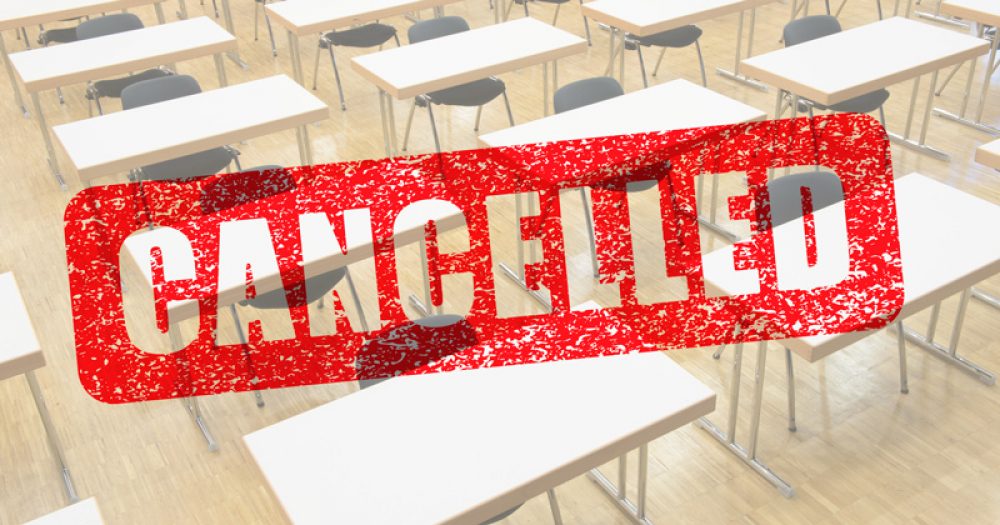Far from the worst thing the DfE could do, changing its mind and reinstating exams would be the best for all concerned, writes Stuart Lock
“Why are they cancelling exams, Sir?”
I don’t know. I can’t even think of a plausible reason for the decision several months before it was necessary to make it. And now that the decision is made, we are cast right back to last spring and summer, like some exam-related Groundhog Day.
What do we do instead?
By now, all the arguments against what Williamson has proposed are well rehearsed. We know that teacher- or centre-assessed grades are subject to human bias, impossible to moderate and require huge amounts of work while heaping pressure onto teachers. We know parents with the sharpest elbows will pressurise teachers and schools – and they will largely not be those from the most disadvantaged backgrounds. We know that around the world, in high-stakes assessments which rely on teacher assessment, there are serious problems with grade inflation.
We know that teacher assessment is also demonstrably biased against the most disadvantaged pupils. We also know this fact in no way impugns their professionalism.
We know that internal assessments compromise the validity of assessments because of a human tendency to teach to the test. And we know that even if we could get over that there is no good way to standardise assessments between schools, let alone grade them.
The current febrile environment amplifies anti-exam voices
The fairest form of assessment is the most valid and reliable – the most accurate – form of assessment. We can either award grades on the basis of exams that uncover what pupils know and can do, or on the basis of speculation about what they don’t and can’t. I can think of no circumstances, even a global pandemic, where the latter is more desirable.
While many DfE decisions in the past ten months have come very late, this one has come too soon and too rashly. More typically, it has come without a satisfactory plan B. Partly, that’s because there isn’t a possible satisfactory plan B. There is simply no better solution than just sitting examinations.
But this is a Department for Education that has made a habit of changing their minds. Doing it again on this might be politically unpalatable, but it wouldn’t even be in the top 10 unpalatable things that have happened this week. In my view, this is one decision they should rescind.
Many of the loudest arguments against examinations are not being made as a result of the current challenges of the pandemic. They are well-rehearsed arguments by campaigns to try and remove them altogether from our education system, rooted in an ideology that believes there must be a better way, but which hasn’t yet deigned to spell it out.
These voices are capitalising on well-intended concerns about fairness to try to achieve their goal. The current febrile environment amplifies their voice. But sober consideration of events and the needs of society and individuals shows that these voices fail to solve the problem they identify. Indeed, they only exacerbate it.
In considering this option, the government should ask itself honestly whether they have the stomach not to, because reinstating examinations next summer is going to take a lot of it. Twelve months from now, the anti-exam voice will only be louder, and the consequences even more severe for young people if it is successful.
Of course, examinations aren’t perfect. They don’t measure everything; some pupils can find them stressful; some find it difficult to show their knowledge in high-stakes conditions; sometimes the questions can be weighted more to certain areas of a course. However, there is simply no better way of assessing students. In examinations, tasks are common, marking is monitored and awards are standardised.
And yes, some pupils have had unfair access to education during the pandemic and this will undoubtedly have exacerbated unfairness that is already present in the system – through private schooling, tutoring, advantaged home-life, going to better schools or simply having better teachers. But we can’t make that unfairness fairer by manipulating the assessment system. All that does is cover up and perpetuate it.
Exams can’t fully mitigate against disadvantage, but they do show it and allow us to do something about it.
So, let’s focus our efforts on that.















“Exams are the fairest way…”
Oh dear. Not that old myth again. Unless of course “fairest” means “delivering grades that are reliable to one grade either way” * – implying that a certificate showing ABB really means “any grades from A*AA to BCC, but no one knows which”.
“Exams are the fairest way…”
Oh dear. Not that old myth again.
Unless, of course, “fairest” means “delivering grades that are reliable to one grade either way” * – implying that a certificate showing ABB really means “any grades from A*AA to BCC, but no one knows which”. What use is that?
https://blogs.lse.ac.uk/socialpolicy/2020/11/30/no-minister-englands-school-exams-are-not-the-fairest-way/
On average, 1 exam grade in 4 is wrong, and around 1.5 million wrong grades are “awarded” every year. As the author (correctly) says “examinations aren’t perfect”. Indeed.
* Not my words, but those given by Ofqual’s then Chief Regulator, Dame Glenys Stacey, in evidence to Select Committee on 2 September.
Fair comment on exams. Because one assessment can’t be 100% reliable. But an examination is more reliable than the alternative – and particularly more reliable than a teacher assessment.
I defend exams as the least-bad form of assessment rather than being perfect.
Explain why one of the best performing English speaking regions in the PISA tests does not do examinations at secondary level apart from a basic literacy test.
Ontario use teacher assessments. Somehow, they have evolved a moderation system for these impossible judgements. Teachers from a region’s schools (not good to mix at present, I agree, but, in this new online existence, not an insurmountable problem) work with other to moderate the ongoing course work to reach final judgments.
That could have happened here, if Gove hadn’t stuck his oar in with half-arsed exam and curriculum reforms based on his own mis-reading of ED Hirsch’s theories.
Now we have a fairly crappy examination system, which is fantastically inaccurate for an examination system. How is this better? It’s not. It has become a data gathering exercise for politicians, who are less than honest about their motivations for collecting it. Is it about knowing schools are improving or is it about kicking schools? Depends on which way the Daily Mail is leaning.
It has caused untold damage to how the curriculum is delivered across England with schools effectively teaching GCSE strategies to Year 7. Progress measure are based on flawed primary phase data.
We seem to spend a lot of money on a system that brings very few people any joy, except for the various companies invested in perpetuating these outdated tests. These urgently needed reform when Gove tried to fix them, and they have urgently needed reform ever since.
“We know that internal assessments compromise the validity of assessments because of a human tendency to teach to the test.” Erm, why is this “human tendency” only applied to internal, not external assessments? The answer, of course, is that it isn’t, as anybody who has set foot in schools in the last couple of decades can attest. It is league tables and the fact schools are ranked purely on these results which drive this “teach to the test” mantra – not the fact whether the assessment is internal or external. On that basis alone, one should see that the current “exams only please” system is ripe for reform.
How about online assessments perhaps in modular form? They could be available all year round whenever a student is ready – with limitless re-sits (rather like that indispensable qualification, the driving test!). Students could choose the qualifications they wish to take – which would vastly increase motivation for many – and teachers could advise and prepare them. There seems to be huge scope to improve the system to me!
Oh Dear! What research has been done by this author prior to writing this piece? It contains no critical evaluation of how universities use predicted exam outcomes for selection. This is the real issue to resolve. Equality in the U.K. is being held back because exams alone are not completely fair. Perhaps a balanced mix of teacher assessment and exams allows some fairness. Most Headteacher now think GCSE is becoming more irrelevant and that post 16 examinations are the only important exams. Scrapping GCSEs would have very little impact on the next steps.
So another U-Turn and more uncertainty for children. We already have enough twisting and turning in the DfE thank you. There are many factors that impact young peoples mental health but the educational climate in this country cannot absolve itself of its responsibility and its obsession with testing doesn’t help. Testing through out the school age range has not delivered better results compared to other systems that do not test as rigorously. Where is the evidence? Testings main purpose is to create a market in the school system and t be used as a stick to beat the profession, the children’s needs and welfare are not the priority.
The issue this year is not just about access during lockdowns: it is also how much actual in-person teaching students have received. One of my students has had to self-isolate twice (a total of almost four school weeks) because of a family member/close contact testing positive, then another two weeks off when they contracted COVID themselves. One of my other students has been in school 100% of the time. The second student has had every lesson in-person while the first has had essentially an entire half term at home. Yes, they had access to at-home learning but that is not the same experience as being in school.
In some areas of the country the situation was even worse for students with whole year groups having to isolate more than once.
Exams normally operate under the idea that the vast majority of students have access to similar experiences – they have two whole academic years to complete specific units of work with a live body in front of them. Yes there are differences (School X has no Maths teachers so the students are being taught by a Physics teacher who is not particularly expert with the GCSE spec, for example, while School Y has exam board markers as their teachers) but for the most part, it’s relatively similar access to education for most students. This year that simply isn’t true. And the exam will be pitting 100% attendance children against forced-to-isolate-for-months children. That isn’t accurate, nor is it fair.
During the Covid-19 period when the most disadvantaged have been even further disadvantaged due to lack of equipment, internet access, time in schools given those schools most impacted by Covid-19 have been in areas of most disadvantage, you still believe exams should be reinstated based on fairness, really???
There is a place for exams, in normal circumstances, but certainly not this year.